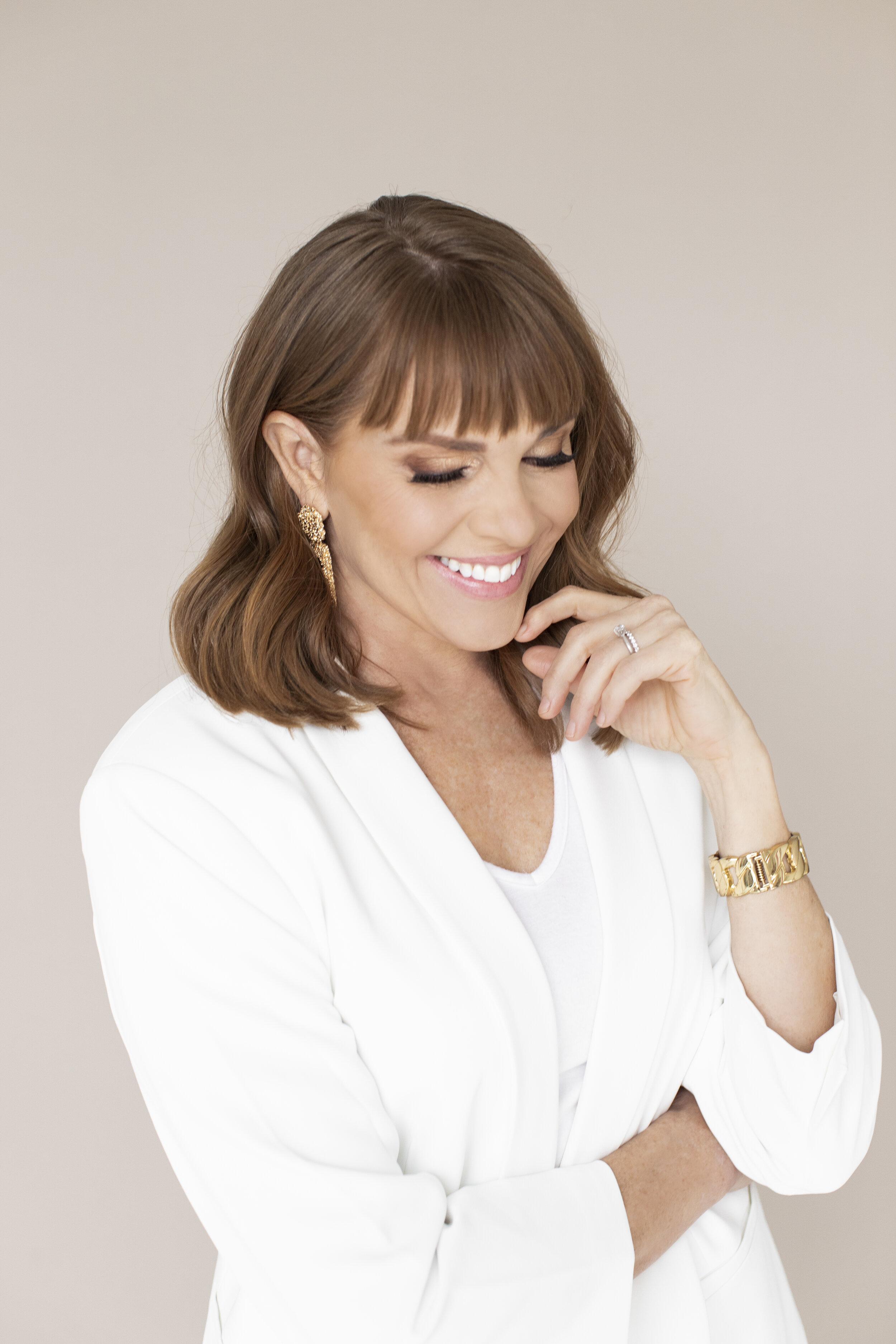
You asked for more content around business finances, so we’re delivering. Welcome to Money Matters where we give you an inside look at the pocketbooks of CEOs and entrepreneurs. In this series, you’ll learn what successful women in business spend on office spaces and employee salaries, how they knew it was time to hire someone to manage their finances, and their best advice for talking about money.

Photo: Courtney McOmber
Vanessa Quigley co-founder of Chatbooks
In an interview with Forbes, you revealed that an intense episode of mom guilt drove you to start Chatbooks. Can you take us back to that moment? What inspired you to launch your business and pursue this path?
I have seven children, and for the first seven years of motherhood, I was very good at scrapbooking our family’s story. But things changed as more babies came and as digital photography became the norm. Years later, I found my youngest, who was five at the time, in bed bawling his eyes out. He had been looking at a little photo album his preschool teacher made for him and was moved to tears when he told me, “Mama, I never want to grow up!” It was adorable and a gut punch all at the same time. I wanted him to be able to hold onto more of his memories and knew that I needed to create an easier way to do that for us and families everywhere!
You’re a mom of seven and the co-founder of Chatbooks along with your husband. How has being a mother changed your priorities and your focus in terms of your career? Do you think motherhood has made you a better business person?
My career has actually made me a better mother. I’m happiest when I’m stretching myself, learning, and growing, and I’ve never felt more stretched before in my life than I have been while building our business. I was a stay-at-home mom for years before becoming an entrepreneur, and motherhood prepared me not only to have my product insight but also taught me the importance of team culture. We refer to our family as “Team Quigley” and I work very hard at helping my children know what it means to be a Quigley and what is expected of them and how important it is that we are all aligned on our goals to work together. And it’s the same for our Chatbooks team.
Since launching Chatbooks in 2014, you’ve raised over $20 million in funding from investors. No doubt you’ve learned a lot along the way—What are three crucial elements everyone should include in a pitch deck when raising money and why?
1. How big is this opportunity? How do we know it’s a big opportunity? How can we show that we’re off to a good start capturing that big opportunity? What is our plan to continue and accelerate the momentum we have?
2. Why now? Why is right now the best time to chase this opportunity? Why was five years ago too early? What market change or technological breakthrough makes today the right time?
3. Why you? Why are we going to win versus the next team? What is the founder-market fit story? What secret have we discovered and do we believe in more than anyone else?
What advice can you share for entrepreneurs on partnering with the right investors? What do investors need to bring to the table other than just money?
It is a partnership. At least, that is how we view it. Investors need to bring expertise in some aspect of company building that complements your own team’s current abilities. Also, make sure you are on the same page as far as a timeline. Some investors are in it for the long haul, and some are looking for more of a quick return. Make sure you’re both trying to win the same game before you bring on a new partner.
Where do you think is the most important area for a business owner to focus their financial energy and why?
It depends on your business, but for us, product and marketing have been the biggest areas of investment. When we raised our Series A it was on the strength of our performance and we just needed more fuel to put on the fire. We had a product that worked, and it was great to be able to get more financing to spend on marketing. Your business is going to grow and you will need money to hire a team to support it and to, most importantly, hire the right people—and that is expensive.
What was your first big expense as a business owner and how should small business owners prepare for that now?
Our first large expense was on the creation of our viral “Real Mom” video. To make the video we spent more than we ever had on anything. However, we got back the investment in three days. Today, the video has more than 100 million views.
What are your top three largest expenses every month?
1. Advertising 2. Printing/shipping 3. Personnel costs
Do you pay yourself, and if so, how did you know what to pay yourself?
In the early days, we did not pay ourselves; it was actually a couple of years of no paychecks. And then we went to the bare minimum, enough to sustain life and pay the bills. As the business has grown and we’ve become more profitable, we have gotten a small raise here and there. The real value now is in our ownership of the company.

Photo: Courtney McOmber
Would you recommend other small business owners pay themselves?
If you don’t have to, then no, bootstrap as much as you can. If you can hire and build the business without paying yourself, then don’t pay yourself. The more ownership you can retain the better. For us, we went a couple of years without paying ourselves and by the time we landed on a product that was working, we had to raise money because we had a business team, seven kids, and a mortgage.
Did you hire an accountant? Who helped you with the financial decisions and setup? Are there any tools or programs you recommend for bookkeeping?
In the beginning, we hired an accountant, and then years later, we got someone in-house at Chatbooks. My husband was an accounting major and has an MBA, so finance stuff was the easy part. Making something people want and figuring out how to sell it is the hard part. Do that and everything else will work out. We recommend starting with Quickbooks and Excel, and then when it gets complicated hire an accountant.
How did you know you were ready to hire and what advice can you share on preparing for this stage of your business?
We were trying to build software and we didn’t know how to code so we needed help with the front-end and the back-end. Luckily, we found our first backend developer on Craigslist and he was really, really good and he is still with us today. That is why we couldn’t pay ourselves because we had to hire for the skills we lacked. Be honest with yourself about your skillset and the help you are going to need. Consider possibly taking on a partner. We took on a partner who was a tech wizard and that is what we needed more than anything.
Do you think women should talk about money and business more?
Yes, yes, yes. Women tend to shy away from talking about money. No topic should be off the table. Whenever I interview an entrepreneur on my podcast, “The MomForce Podcast,” I ask them about funding and money matters. I think we should all be more comfortable talking about that.
Do you have a financial mentor, and do you think all business owners need one?
Yes, everyone needs one unless you have a background in that. That could be an adviser, investor, or partner. There are some things that you can do early on in your business that will have real, lasting repercussions. I also suggest hiring a lawyer to help protect your business from the get-go.
What money mistakes have you made and learned from along the way?
We gave some equity to advisors early on. That, in some cases, was really helpful because we could give equity instead of payment, but we had varied success with that. Some people did a ton to help us and were really engaged with us and some, not so much. If I could do it again I would be more careful choosing advisors and working more closely with them. I wish we had set regular meetings with them and gotten more out of the relationships.
What is your best piece of financial advice for new entrepreneurs?
Don’t run out of money. No, but seriously, figure out what is most important in growing your business, and don’t get ahead of yourself. We didn’t have a glamorous office space in the beginning, just a corner with a bunch of desks in a shared space. Today, we have a beautiful office with sweeping views of Utah Lake. When you are going to hire, get the best people. The best is not always the most expensive. If you realize it is not a good fit, don’t be afraid to cut them and start again. A lot of mistakes are made in hiring. Don’t be afraid to say this isn’t working and try again.
Anything else to add?
“The Lean Startup” is the bible. And creating an MVP, a minimally viable product, to test your concept before going all-in is a must. Start small, do a test, see if there is interest. Like doing a pre-sale or Kickstarter, just get really creative to test the concept before you spend. When we started showing Chatbooks to people and they said, “Shut up and take my money!,” we knew we were onto something good and ready to invest.

